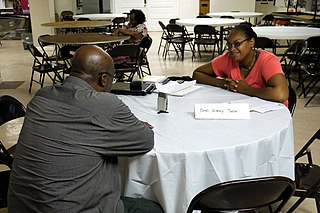
Oral history is the collection and study of historical information about people, families, important events, or everyday life using audiotapes, videotapes, or transcriptions of planned interviews. These interviews are conducted with people who participated in or observed past events and whose memories and perceptions of these are to be preserved as an aural record for future generations. Oral history strives to obtain information from different perspectives and most of these cannot be found in written sources. Oral history also refers to information gathered in this manner and to a written work based on such data, often preserved in archives and large libraries. Knowledge presented by Oral History (OH) is unique in that it shares the tacit perspective, thoughts, opinions and understanding of the interviewee in its primary form.

Digitization is the process of converting information into a digital format. The result is the representation of an object, image, sound, document, or signal obtained by generating a series of numbers that describe a discrete set of points or samples. The result is called digital representation or, more specifically, a digital image, for the object, and digital form, for the signal. In modern practice, the digitized data is in the form of binary numbers, which facilitates processing by digital computers and other operations, but digitizing simply means "the conversion of analog source material into a numerical format"; the decimal or any other number system can be used instead.
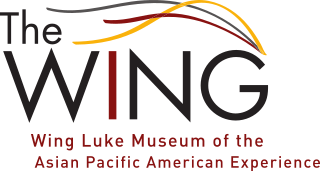
The Wing Luke Museum is a museum in Seattle, Washington, United States, which focuses on the culture, art and history of Asian Pacific Americans. It is located in the city's Chinatown-International District. Established in 1967, the museum is a Smithsonian Institution affiliate and the only pan-Asian Pacific American community-based museum in the country. It has relocated twice since its founding, most recently to the East Kong Yick Building in 2008. In February 2013 it was recognized as one of two dozen affiliated areas of the U.S. National Park Service.
Roy Rosenzweig Center for History and New Media (RRCHNM), formerly the Center for History and New Media (CHNM), is a research center specializing in digital history and information technology at George Mason University (GMU) in Fairfax County, Virginia. It was one of the first digital history centers in the world, established by Roy Rosenzweig in 1994 to use digital media and information technology to democratize history: to incorporate multiple voices, reach diverse audiences, and encourage popular participation in presenting and preserving the past. Its current director is T. Mills Kelly.

Visual Communications –– is a community-based non-profit media arts organization based in Los Angeles. It was founded in 1970 by independent filmmakers Robert Nakamura, Alan Ohashi, Eddie Wong, and Duane Kubo, who were students of EthnoCommunications, an alternative film school at University of California, Los Angeles. The mission of VC is to "promote intercultural understanding through the creation, presentation, preservation and support of media works by and about Asian Pacific Americans."
South Asian Americans or Desi Americans are Americans of South Asian ancestry. The term generally excludes Afghanistan, referring specifically to those who can trace back their heritage to the Indian subcontinent, which includes the countries of Bangladesh, Bhutan, India, Maldives, Nepal, Pakistan, and Sri Lanka. The South Asian American diaspora also includes generations of South Asians from other areas in the world who then moved to the United States, areas such as Guyana, Trinidad and Tobago, Canada, the United Kingdom, the Netherlands, France, Australia, New Zealand, Fiji, South Africa, Uganda, Kenya, Tanzania, Mauritius, Singapore, Malaysia, Suriname, other parts of the Caribbean, etc. In the United States census they are a subcategory of Asian Americans, although individual racial classification is based on self-identification and the categorization is "not an attempt to define race biologically, anthropologically, or genetically".
Him Mark Lai was a historian of Chinese American, a leader of the Chinese-American community, and writer. He helped restore the state of Chinese American historiography. Lai "rescued, collected, catalogued, preserved and shared" historical sources in Chinese and English. He was known as the "Dean of Chinese American history" by his academic peers, despite the fact that he was professionally trained as a mechanical engineer with no advanced training in the academic field of history. The Chronicle of Higher Education named Lai "the scholar who legitimized the study of Chinese America".

The Southern Oral History Program (SOHP), located in the Love House and Hutchins Forum in the historic district of Chapel Hill, North Carolina, is a research institution dedicated to collecting and preserving oral histories from across the southern United States.

The Rare Book & Manuscript Library is principal repository for special collections of Columbia University. Located in New York City on the university's Morningside Heights campus, its collections span more than 4,000 years, from early Mesopotamia to the present day, and span a variety of formats: cuneiform tablets, papyri, and ostraca, medieval and Renaissance manuscripts, early printed books, works of art, posters, photographs, realia, sound and moving image recordings, and born-digital archives. Areas of collecting emphasis include American history, Russian and East European émigré history and culture, Columbia University history, comics and cartoons, philanthropy and social reform, the history of mathematics, human rights advocacy, Hebraica and Judaica, Latino arts and activism, literature and publishing, medieval and Renaissance manuscripts, oral history, performing arts, and printing history and the book arts.
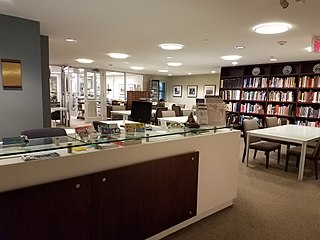
Woodson Research Center is an archive located in Fondren Library at Rice University in Houston, Texas. The Center is named for Benjamin N. Woodson and houses the special collections of Rice University's Fondren Library which includes manuscript collections, rare books, and the Rice University archives. Within the manuscript collections, there are archives focused on specific collecting areas, which include the Houston Asian American Archive, the Houston Folk Music Archive, and the Houston Jewish History Archive.
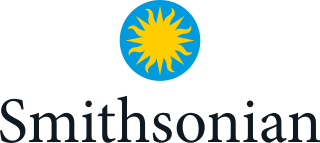
Smithsonian Libraries and Archives is an institutional archives and library system comprising 21 branch libraries serving the various Smithsonian Institution museums and research centers. The Libraries and Archives serve Smithsonian Institution staff as well as the scholarly community and general public with information and reference support. Its collections number nearly 3 million volumes including 50,000 rare books and manuscripts.

Densho is a nonprofit organization based in Seattle, Washington whose mission is “to preserve and share history of the WWII incarceration of Japanese Americans to promote equity and justice today.” Densho collects video oral histories, photos, documents, and other primary source materials regarding Japanese American history, with a focus on the incarceration of Japanese Americans during World War II. Densho offers a free digital archive of these primary sources, in addition to an online encyclopedia and curricula, for educational purposes.

Asia Art Archive (AAA) is a nonprofit organisation based in Hong Kong which focuses on documenting the recent history of contemporary art in Asia within an international context. AAA incorporates material that members of local art communities find relevant to the field, and provides educational and public programming. AAA is one of the most comprehensive publicly accessible collections of research materials in the field. In activating its collections, AAA initiates public, educational, and residency programmes. AAA also offers research grants and publishes articles on IDEAS Journal.
The Vietnam Center and Archive collects and preserves the documentary record of the Vietnam War. The Vietnam Center and Archive, part of Texas Tech University, is the nation's largest and most comprehensive collection of information on the Vietnam War. On August 17, 2007, the Texas Tech Vietnam Center became the first U.S. institution to sign a formalized exchange agreement with the State Records and Archives Department of Vietnam. This opens the door for a two-way exchange between the entities.

The National Hellenic Museum is the second oldest American institution dedicated to displaying and celebrating the cultural contributions of Greeks and Greek-Americans. Formerly known as the Hellenic Museum and Cultural Center, the National Hellenic Museum is located in Chicago’s Greektown, at the corner of Halsted and Van Buren Streets. The National Hellenic Museum has recently undergone a modernization program that cumulated in the museum moving to its current building in December 2011. The official opening of the NHM took place on December 10th, 2011 and proved to be a marked event within the Greek community of Chicago.
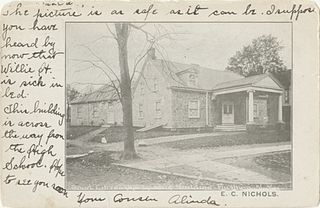
The Queens Memory Project is a community archiving program which aims to record and preserve contemporary history across the New York City borough of Queens. Community archives are created in response to needs defined by the members of a community, who may also exert control over how materials are used. The project is a collaborative effort between Queens College, City University of New York and Queens Public Library that was initially funded in 2010 through a grant from the Metropolitan New York Library Council (METRO). Materials in the archive are made accessible to the public through a website which contains oral history interviews and photographs documenting the lives of Queens residents. The stories and images are presented alongside digitized historical photographs, maps, news clippings and other archival records. The goal of the project is to allow visitors to the site to view otherwise scattered archival materials and personal stories in a searchable database of collective memory representing the borough of Queens.
The Jewish Digital Archive Project (JDAP) is a community project that connects people by creating an online home for old movies, photographs and oral history interviews.

The Canadian Museum of Immigration at Pier 21, in Halifax, Nova Scotia, is Canada's national museum of immigration. The museum occupies part of Pier 21, the former ocean liner terminal and immigration shed from 1928 to 1971. Pier 21 is Canada's last remaining ocean immigration shed. The facility is often compared to Ellis Island (1892–1954), in terms of its importance to mid-20th-century immigration to Canada an association it shares with 19th century immigration history at Grosse Isle, Quebec (1832–1932) and Partridge Island in Saint John, New Brunswick (1785–1941). The museum began as an independent institution run by the Pier 21 Society in 1999. It became a national museum run by the Canadian federal government in 2011.
Community archives are archives created or accumulated, described, and/or preserved by individuals and community groups who desire to document their cultural heritage based on shared experiences, interests, and/or identities, sometimes without the traditional intervention of formally trained archivists, historians, and librarians. Instead, the engaged community members determine the scope and contents of the community archive, often with a focus on a significant shared event, such as the Ferguson unrest (2014). Community archives are created in response to needs defined by the members of a community, who may also exert control over how materials are used.
The Houston Asian American Archive (HAAA) is a faculty-led, student-run archive with both digital and physical presence at Rice University, for the sole purpose of scholarship. The Archive consists primarily of its oral history collection of over 300 interviews; in addition, it also runs programs such as exhibitions which showcase the archival materials, interactive and creative community projects, podcasts, panels discussions and other events surrounding the topics of Asian and Asian American experiences. The Archive is managed by the Chao Center for Asian Studies at Rice University.













